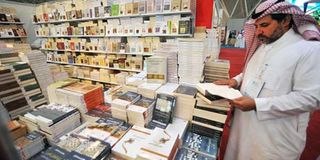Inviting writers to event where their books aren’t on sale a bad idea

Now, inviting writers to a literary event where their books are not on sale is possibly not the best way to ingratiate oneself to writerly guests. PHOTO | FILE
What you need to know:
- Fortunately, disaster was averted when they received the contacts of my favourite Johannesburg bookstore owner. The downside was that, because it was such late notice, he could not source all the books of the writers that were taking part.
- The events did not run on time, but in defence of the organisers this time, I think I have only attended three literary events that started on time.
- In the lecture entitled, Literature and Freedom, Forna highlighted how even a prisoner can be freed by literature as they visit lands they may not always be able to go to.
Last weekend in Johannesburg, I was part of a literary event with the potential of having a celebrated profile continentally. The 3rd African Women Writers’ Symposium, organised by the South African Department of Arts and Culture seemed to fail on the organisational part of things in so many ways.
The first symposium was in 2010 and the second one was in 2011. One would have hoped by now that after the three-year time of reflection, the third one would have been better organised.
Organising such a literary event when there had been three other literary festivals the week before in South Africa - Open Book, Jozi Book Fair and Limpopo Literary Festival, and another one on the continent at the same time (Storymoja) was probably not a great idea. It screamed to me that perhaps the organisers were just bureaucrats in the Ministry who do not really take the literature scene seriously but are just there for the pay cheque.
For the first time in the history of the event, there was going to be a lecture commemorating one of Africa’s literature laureates, the late Nadine Gordimer.
I recall asking the organizers at least a week in advance for the programme so I could circulate it. Unfortunately, despite an impressive line-up that included my fellow Etisalat judge Molara Wood, Yvonne Adhiambo Owuor, South African National Poet Laureate Keorapetse Kgositsile, and Linton Kwesi Johnson (who suggested that I should use this column to ask Muthoni Garland to invite him to Storymoja next year) among many others, we only received the programme two days before the events started.
LITERATURE AND FREEDOM
This meant that, much as I and my Johannesburg writer friends had hoped to attend the keynote address on the opening night by African-American author Sapphire, we could not as it clashed with the launch of feminist scholar and the University of the Witwatersrand Professor, Pumla Gqola’s newest book.
I also found out from sending emails to one of the organisers, that there was no bookseller who had been reserved to sell books at the event. Now, inviting writers to a literary event where their books are not on sale is possibly not the best way to ingratiate oneself to writerly guests.
Fortunately, disaster was averted when they received the contacts of my favourite Johannesburg bookstore owner. The downside was that, because it was such late notice, he could not source all the books of the writers that were taking part.
The events did not run on time, but in defence of the organisers this time, I think I have only attended three literary events that started on time.
At least one of the moderators liked the sound of their voice more than those of their panelists but otherwise the discussions were titillating despite the vague and rather broad topics.
My favourite part of the whole symposium was the Inaugural Nadine Gordimer Memorial Lecture presented by Commonwealth Prize winner, Aminatta Forna.
In the lecture entitled, Literature and Freedom, Forna highlighted how even a prisoner can be freed by literature as they visit lands they may not always be able to go to.
She paid particular focus on Gordimer’s work during the apartheid era and how it informed the world that may not always have been aware, what was happening in South Africa.
Perhaps highlighting how little literature is sometimes taken seriously, Forna recounted how she sat next to a seemingly successful South African businessman on a flight from Washington DC who had never heard of the late Literature Laureate.
She told this anecdote in response to the embarrassing howls from the audience, during her question and answer session after her address when a young man asked, “So who is this Nadia Gordimer?”
When the Nigerian writer who was seated next to me looked at me in horror, I shrugged my shoulders and said I was Kenyan.
There were some things that the organisers got right. The venue, The Fringe at the Joburg Theatre, was very accessible to the writers who were taking part and to Joburg literature lovers and being in Braamfontein, safer than the Windybrow Theatre where the first symposium took place.
If however, The African Women Writers’ Symposium hopes to take pride of place continentally as the place to go to for African women writers, more shall need to be done.





